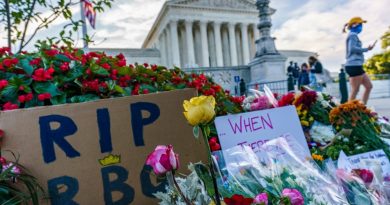Freedom Convoy made it ‘near impossible’ to live, Zexi Li tells trial
The young public servant was thrust into the spotlight when she agreed to become the lead plaintiff in a multi-million-dollar proposed class action against Freedom Convoy organizers are testifying in the criminal trial of two of them: Tamara Lich and Chris Barber.
Zexi Li’s testimony came on the 17th day of trial for Lich and Barber, who are each charged with mischief, counseling others to commit mischief, intimidation, and obstructing police for their role in the weeks-long protest in January and February of 2022.
Li testified she was working from her downtown home during the COVID-19 pandemic, including when protesters came to Ottawa.
Shadowed by court security, she said from the witness box it was “near impossible” to get by during the protest and “difficult to live as a human being,” describing the horns as “constant.”
She said the horns blared “most commonly” between 7 a.m. and 11 p.m. and sometimes there were occasional blasts of horns throughout the night. She also described a “very loud” noise that was reminiscent of an air raid horn.
Li is one of the local witnesses called by Crown lawyers, along with business owners and other residents, to illustrate the scope, nature, and consequences of the protests and “rebut” any suggestion it was peaceful.
The Crown is trying to establish that Lich and Barber had “control and influence” over the crowds and encouraged others to join the protests while also fundraising.
‘Intimidated’ by protesters, Li says
After a court injunction was successfully granted against the honking, Li said horns continued to blare though they were less common, along with some “scheduled” honking as the noise “permeated my existence,” she testified.
“The honking happened so consistently that even when it wasn’t [happening], I could expect it to happen at any other time.”
Li, wearing a white silky v-neck T-shirt with matching wide-leg dress pants, said during the following weeks of protests there would be “scheduled” honking.
“The sound was less sporadic and more like the sound was all happening. closer to the same moment, rather than it being more spread out,” she said, adding there were also other instances of “collective honking” taking place.
During cross-examination, Li told Lich’s lawyer Lawrence Greenspon she heard honking specifically on Feb. 7 and then again on either Feb. 17 or 18.
She said she couldn’t speak to the duration or specific dates of when she heard honking, an air-raid siren, megaphones, a roaming horn, or fireworks.
The injunction granted on her behalf sought only to stop the honking for an initial period of 10 days, allowing for peaceful, lawful, and safe protests to be permitted so long as the injunction wasn’t violated.
The injunction was extended beyond the original 10-day period after the original order expired, with the same terms in place.
Barber faces an additional charge of counseling others to disobey the Feb. 7 court order that banned loud honking in Ottawa’s downtown core.
Earlier in the trial, the court heard how two days after the Ontario Superior Court granted the original injunction against honking, Barber posted a video to TikTok warning supporters there were rumors police action could be coming within days.
In the video submitted as evidence, Barber says the “horns have to be quiet” — but if a trucker sees police enforcement starting, they should “grab that horn switch and don’t let go of that.”
Li described feeling “intimidated” by an encounter with a trucker who shook his fist and honked his horn, and described protesters establishing structures to become more entrenched as the Freedom Convoy continued, including a “makeshift soup kitchen.”
By the third week, after the injunction had been granted against honking, she said protesters became “hostile” when she was taking pictures. She described calling the police after a truck backed into her.

Gridlock caused
Under cross-examination, she said the truck didn’t make contact with her “only because I moved out of the way.”
She said she believed police filed a report but no further action was taken as a result of the incident.
Li also described convoy vehicles slowing down ambulances that had been responding to a call and roads that were “completely blocked off,” but she couldn’t remember specifics.
She also said she couldn’t take the bus because routes were relocated and the smell of gasoline from idling vehicles in the downtown core was “almost inescapable at times.”
At one point during her testimony, she was cautioned to stop using the word “occupation” because the trial is using “protest” or “demonstration” to describe the events of the convoy, while “occupation” has a different legal definition.
Barber’s lawyer Diane Magas objected to the continued use of the term saying the word was “irritating” and “inflammatory.” Justice Heather McVey-Perkins told the court the language could impact the credibility of Li’s testimony.

